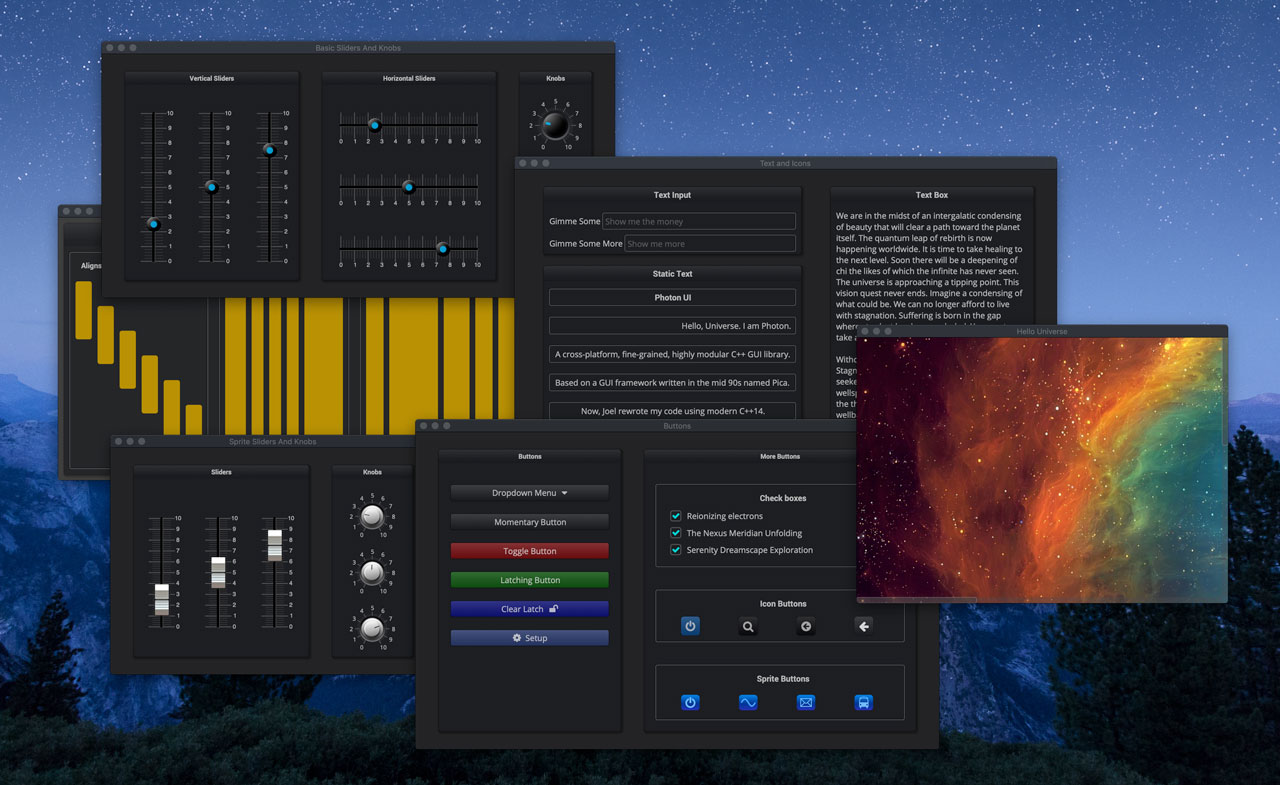Elements is a lightweight, fine-grained, resolution independent, modular GUI library. Elements is designed with these requirements in mind:
- It should be open source with a liberal, non-viral license.
- It should be usable in any application and should play well with other GUI libraries and frameworks.
- Corollary to the second requirement is that it can also be used to develop plugins. It should not own the event loop and should be able to co-exist with components within a plugin host such as VST and AU.
- It should be resolution independent and allow for HDPI displays.
- Should not rely on a “visual” GUI editor or code generator.
- It should have a declarative API using modern C++. Declarative C++ code tells you what rather than how (imperative). The GUI should be declared in C++ code.
- Keep it simple. Make it easy to use right out of the box, with a lot of examples.
- Porting to a new host target should be as easy as possible, requiring porting of only a few files.
Elements, is extremely lightweight… and modular. You compose very fine-grained, flyweight “elements” to form deep element hierarchies using a declarative interface with heavy emphasis on reuse.
Please take note that Elements is still very much in flux as we are inching closer towards a version 1.0 release. The API and code is still undergoing continuous changes, and for that matter, Elements is not yet "production ready". But that should not prevent you from using Elements now! It is already in a very usable form, and more people using it will ultimately make it more robust when bugs are reported and fixed. API and usability matters and I very much welcome suggestions and contributions. Hey, this is an open source project! If you like the design, concepts and ideas behind Elements, I very much welcome collaboration.
- 19 January 2021: Added Child Windows to develop (will merge to master in due time). See Example.
- 25 September 2020: Added thumbwheels.
- 12 September 2020: Linux Artist 2D Canvas Library port feature complete.
- 10 September 2020: Windows Artist 2D Canvas Library port feature complete.
- 7 September 2020: MacOS Artist 2D Canvas Library port feature complete.
- 22 June 2020: Removed dependency on Boost. This requires some API changes to
the
appwith additional arguments. See examples. - 26 May 2020: Introducing the Artist 2D Canvas Library. The Artist library will eventually replace Element's 2d canvas implementation.
- 23 May 2020: Work in progress
notebookgallery factory (notebookbranch). - 8 April 2020: Simplified installation (Infra and Json are now header-only submodules)
- 11 March 2020: Added Layout documentation.
- 3 March 2020: Added Design Aspects documentation.
- 23 February 2020: Setup and Installation guide updated for Windows and Linux.
- 22 February 2020: Improved font support
- 01 September 2019: Linux port completed
- 12 August 2019: Windows port completed
Feel free to join the discord channel for discussion and chat with the developers.
Documentation is work in progress. Stay tuned...
Joel got into electronics and programming in the 80s because almost everything in music, his first love, is becoming electronic and digital. Since then, he builds his own guitars, effect boxes and synths. He enjoys playing distortion-laden rock guitar, composes and produces his own music in his home studio.
Joel de Guzman is the principal architect and engineer at Cycfi Research and a consultant at Ciere Consulting. He is a software engineer specializing in advanced C++ and an advocate of Open Source. He has authored a number of highly successful Open Source projects such as Boost.Spirit, Boost.Phoenix and Boost.Fusion. These libraries are all part of the Boost Libraries, a well respected, peer-reviewed, Open Source, collaborative development effort.
Copyright (c) 2014-2022 Joel de Guzman. All rights reserved. Distributed under the MIT License

